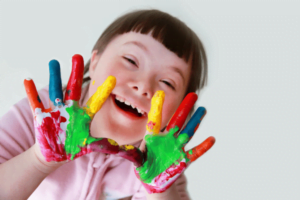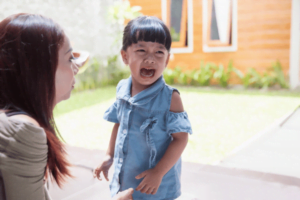OTHER CHALLENGES
ADDITIONAL INFORMATION
Beyond the physical realm, childhood can also be a time of navigating complex emotions and social interactions. While some challenges are a natural part of growing up, others can become significant hurdles. This article explores other challenges children might face, including anxiety disorders and depression. We’ll delve into the signs and symptoms, explore potential causes, and most importantly, discuss effective strategies to help children overcome these difficulties and build emotional resilience.
While ONE Intervention focuses on helping children with Neurodevelopmental Disorder or Developmental Delay, we also help children with other challenges such as the following four:

Down Syndrome
Down syndrome is a genetic condition that occurs when an individual has an extra copy of chromosome 21. This can lead to a variety of developmental delays and challenges, but it’s important to remember that every child with Down syndrome is unique. With the right support and resources, children with Down syndrome can reach their full potential and live fulfilling lives.
Early childhood is a crucial period for development in all children, and this is especially true for children with Down syndrome. During this time, they are building the foundation for their future learning, communication, and social skills.
Here are some areas where children with Down syndrome may require additional support:
- Physical development: Children with Down syndrome may experience lower muscle tone, impacting their ability to reach developmental milestones like crawling, walking, and coordination.
- Speech and language development: They may experience delays in learning to speak and communicate effectively.
- Cognitive development: Learning and problem-solving skills may develop at a slower pace.
- Social development: Social interaction and building relationships with others may require additional support.

Anxiety Disorders
Anxiety disorders are surprisingly common in children, affecting millions of youngsters across the globe. While it’s normal for children to experience occasional worries or fears, persistent and excessive anxiety can significantly impact their daily lives, causing emotional distress and hindering their ability to function at school, at home, and in social settings.
Here are some common signs to watch for:
- Excessive worry or fear about everyday situations
- Difficulty concentrating or staying focused
- Irritability and frustration
- Trouble sleeping or frequent nightmares
- Physical symptoms like stomachaches, headaches, or dizziness
- Avoiding certain activities or situations due to fear
It’s important to remember that these signs can also occur in children for other reasons.

Depression
Depression is a complex mental health condition that can affect individuals of all ages, including children. While it’s normal for children to experience occasional sadness or low moods, persistent and intense feelings of hopelessness, loss of interest in activities they once enjoyed, and changes in sleep and appetite can be signs of depression.
Here are some common signs to watch for:
- Persistent sadness or low mood for an extended period
- Loss of interest in activities they once enjoyed
- Changes in sleep patterns, such as sleeping too much or too little
- Changes in appetite, such as eating significantly more or less than usual
- Difficulty concentrating or making decisions
- Feelings of worthlessness or guilt
- Withdrawal from social activities or isolation
- Thoughts of death or suicide
It’s important to remember that these signs can also occur in children for other reasons. If you have concerns about your child’s emotional well-being, contact One Intervention Centre for a proper diagnosis and guidance.

Behavioural Problems
Every child develops – differently, and sometimes, behaviours can be challenging to manage. While occasional outbursts or tantrums are normal during early development, persistent and disruptive behaviours can create stress for both children and their families.
It’s important to remember that challenging behaviours are often a child’s way of communicating a need or expressing frustration.
These needs could be:
- Difficulty communicating their wants and feelings effectively
- Difficulty managing emotions like frustration, anger, or anxiety
- Sensory sensitivities overwhelming the child
- Underlying developmental delays or learning challenges
Identifying the root cause of the behaviour is crucial for developing effective intervention strategies.
